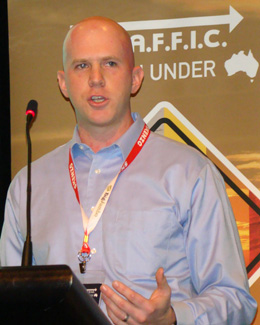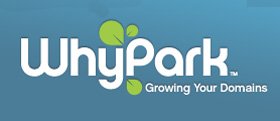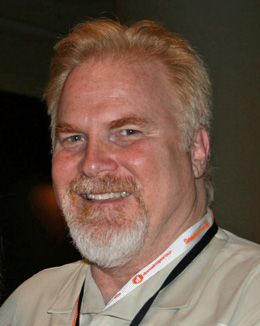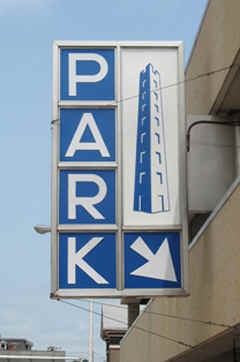|

WhyPark.com
Founder Craig Rowe
speaking at the T.R.A.F.F.I.C. Down
Under conference (November 2008)
|
By
Ron Jackson
Though WhyPark.com
just celebrated its 3rd birthday, the
company is the granddaddy of the rapidly
expanding mass domain development space. Craig
Rowe launched the company in March 2006 and
he continues to manage the product development
and day to day growth of WhyPark. He has
been active in domain development since 1998
and has built and sold a number of sites and
successful, web-based services.
Others who play key
roles at the company are Stephen Douglas, the
VP of Business Development (responsible for
managing large accounts and creating
partnerships for add-on services, content,
etc.),
Rod
Underhill
, co-founder of mp3.com, who is an
advisor to WhyPark and Alan Macomber who
is both an investor and Board Director.
Rowe told us "WhyPark
was built out of seeing a need for doing
something more with domains, but in a mass
scale environment. There’s
|
|
Stephen Douglas added "it is my belief that WhyPark
is the "Evolution
of Domain Monetization™" for
domain investors, because using WhyPark allows the
domainer to choose many different paths to obtain
revenue." Rowe and Douglas responded to additional
questions I had about WhyPark's service in the interview
below.
DN Journal:
Let's start with some specific details about the WhyPark
program – how you attack the problem of developing a
large number of sites at an affordable cost.
|

|
WhyPark:
WhyPark is unique in that we match full-text,
licensed content with a domain name’s theme
based on relevancy. To get started,
there’s a one-time fee of $99 to
support up to 100 domains. More
domains can be added at anytime, and there are
discounts for larger accounts. There are no
monthly fees, although we do offer
subscription based options that include |
| additional features
like a greater range of premium content, image
hosting, discounts on our managed and
promotional services, automated newsletter
options, etc. |
Development within WhyPark is as
easy as filling out forms, choosing categories and
layouts for your domains and pointing the nameservers to
us. We then match those keywords with our growing
database of content to create highly relevant,
niche sites that typically have about 35 pages per
site. We don’t use RSS feeds for content,
which his really important, since the focus is on
keeping a user on your domain and bringing them back,
rather than immediately pushing them out.
|
DN
Journal: While these sites are often
referred to as mini-sites, many of the current
services allow domain owners to add their own
content and advertisers (or feeds) to further
the development process. To what degree does
your system allow this? Does your service
allow a domain owner, to plug in third party
content from a source like Tinbu
for example?
WhyPark: Since
we launched in 2006, we’ve always allowed our
customers to customize their sites on
WhyPark. That includes the ability to
customize layouts, add unique pages of custom
content and manage how they want to monetize
their domains; whether that be through our
integrated PPC feed or by using their
third-party ad feeds, CPA offers, text links,
etc.
Yes, customers could use
Tinbu modules as well, and we’ve been talking
with them about creating easy integration of
their modules. Our focus has always been
on providing tools to make it easy to launch and
customize domains. |

Stephen
Douglas, WhyPark.com
VP, Business Development |
DN Journal:
The #1 question on domain owner’s minds will be, will
this service make more money for me than parking
the same domains?
WhyPark:
WhyPark's business model is one that isn't meant or
intended to compete with "traditional" PPC
companies. Our focus is on developing out those domains
that wouldn’t otherwise make revenue through
parking. In terms of direct monetization, I’d
say that parking performs better in the short-term on a
revenue per visitor basis. You’re getting a
visitor to the site and offering them only paid options
to leave, or back out of the site. However, you
always need fresh visitors since you won’t get repeat
traffic or build new traffic through new incoming links,
referrals, etc.
Development, whether through
WhyPark or anyone else, is a long-term commitment where
you’re creating value for the visitor.
We’ve been online for 3 years now, so we do have that
track record of building sustainable sites that continue
to grow in revenue and traffic. We have a mature
platform that continues to evolve with changes in our
industry and in user behavior. We’re always
honest with our customers though that if you have very
short-term goals and already have substantial revenue
with a parking service, then you’re in good hands.
If you want to build more traffic and create a
sustainable business model with new options for traffic
outside of just type-in, then you need to develop.
For that huge percentage of domains that do not have any
traffic, you’ll need to develop to earn any revenue
and build up traffic.
|

Just
as landscaping gives homes "curb appeal,"
making them easier to sell, content can
do the same thing for domain names. |
DN
Journal: Many developers say there
are additional benefits, beyond immediate
monetization, to moving beyond the parking page.
For example, more “curb appeal” for
potential buyers, less likelihood of inadvertent
trademark infringement (from ads served by the
PPC company), etc. What do you see as the added
benefits of following at least a minimal
development strategy?
WhyPark:
Relevant content on a domain is important for a
domain investor who owns non-performing domains
that still have potential resale or development
value. By developing a domain, there’s
so |
| much more potential
to continually build new traffic and revenue
rather than waiting for it to appear someday, or
watch as ad blindness will erode the traffic and
revenue that may exist on that domain today.
Some other benefits of development:
|
• Content
will help get the domain indexed by search engines.
Parking your domain will never get visibility outside of
traffic that already exists on the domain.
•
Content can give the domain name credibility, and
customizing the content regularly may help you get
return visitors.
• Content
can give the domain name "curb appeal" as you
put it, for potential buyers. Our experience in the past
has been end-users don't see the value of a domain that
is just sitting with a page full of sponsored links on
it. It's similar to a home buyer - real estate agents
know that having a home nicely accommodated with
furniture and accessories helps potential buyers
"get a feel" for that property’s potential
and will increase the likelihood of a sale.
•
Developing a generic domain can help with protection
from trademark infringement on generic terms as well.
By developing content related to the generic term and
not related to the company that may own that generic
trademark, development can help protect you from willful
infringement of a trademark. It shows that your
interest in the domain is genuine and focused on the
theme of the generic term only and not of a company’s
trademark.
DN Journal:
Parking is a well established industry with many major
players. Your service category is the new kid on the
block. How do you see the equilibrium between these two
sectors (parking and mini-site development) changing
over the next couple of years – do they both hold
their own, does the balance of power shift, etc?
|
WhyPark:
I see there being a place for parking companies
and development. Parking does a great job
at monetizing existing traffic with very little
effort being required from the domainer.
However, domain development is going to be
required for building traffic and revenue on
good domains that simply have little or no
traffic or revenue.
When PPC was doing well,
domainers could more easily afford to carry
those good names even though there wasn’t
revenue there. Now, as PPC declines, a
decision has to be made to sell those domains in
a buyer’s market, hold onto them and have a
less profitable portfolio, or develop the names
and bring them to life. Development
gives those domains a chance at new revenue
and traffic. WhyPark does this very
inexpensively and focuses on making the process
quick, easy and customizable for domainers.
I don’t necessarily see
parking declining on those domains that do well.
It’s simply too easy to keep them parked and
collect the revenue, even if it’s declining.
However, I do |

|
| think you’ll see a
mass migration of underperforming domains
from parking companies to development platforms
like WhyPark as domainers see the need to
develop as a hedge against declining PPC
revenue, and an increasingly more sophisticated
visitor who can quickly discern a page of ads
from a real site.
|
DN Journal:
Thank you for taking time to give us this insight into
WhyPark's mass development solution. Is there anything
you would like to ad before we close?
WhyPark:
In Summation: WhyPark provides a wide variety
of ways to help a domainer realize their domain's
value if they aren't getting adequate returns from PPC.
We have a mature platform in place to help
domainers easily develop new traffic and revenue from
their underperforming domains.
The satisfaction from seeing a
domain name start to blossom with content can be
inspiring to the domain investor in providing new ideas
on how to monetize the domain, while increasing the
traffic and revenue. With WhyPark, we are planting
the seed, and providing easy and inexpensive tools
to help your domain grow.
|
Click
any of the links in this table to
learn about the mass website development
services provided by other companies
featured in this DN Journal Cover
Story. |
|
|
|
|
|
|
|
|
|






















